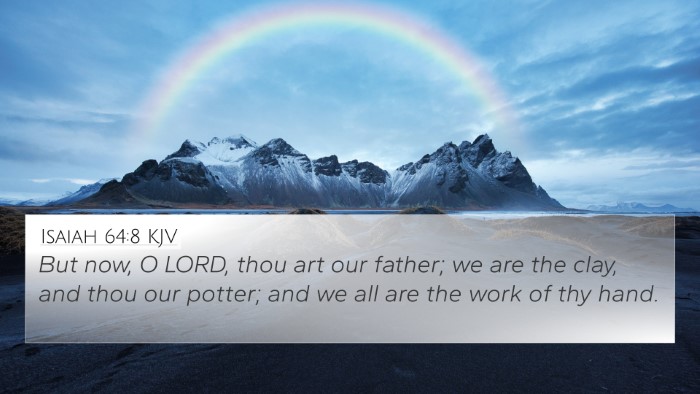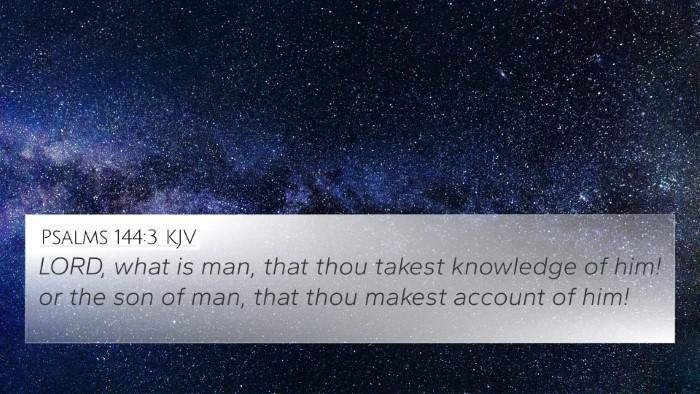Understanding Genesis 18:27
Genesis 18:27 states: “And Abraham answered and said, ‘Indeed now, I who am but dust and ashes have taken it upon myself to speak to the Lord.’” This verse is part of a larger narrative illustrating Abraham's intercession for Sodom, showcasing themes of humility, dialogue with God, and the complexity of divine judgment.
Historical Context
In the broader context of Genesis, Abraham's conversation with the Lord reveals not only his concern for his nephew Lot and the inhabitants of Sodom but also sets the stage for the revelation of God’s justice through the impending judgment. Understanding this passage requires us to reflect on Abraham’s character and relationship with God.
Commentary Insights
- Matthew Henry: He emphasizes Abraham's humility as he approaches the Lord, recognizing his unworthiness by describing himself as “dust and ashes.” This acknowledgment of his own finite nature leads him to intercede with great reverence and a sense of personal insignificance.
- Albert Barnes: Barnes interprets this verse as a demonstration of humility in prayer. Abraham’s self-description illustrates an essential attitude in prayer—a recognition of our lowly position and a deep respect for the Divine.
- Adam Clarke: Clarke highlights that Abraham, despite the gravity of the situation, approaches God with both confidence and humility. His intercession signifies a deep understanding of God’s righteous nature and mercy, which becomes a pivotal aspect of Abraham's relationship with God.
Thematic Connections
This verse showcases several important biblical themes, including:
- Humility in Prayer: Abraham's recognition of his humble position reminds believers to approach God with a similar mindset (James 4:10).
- Divine Justice: The underlying narrative conveys significant discourse on God’s justice and mercy, reflected through Abraham's inquiry about the fate of Sodom (Ezekiel 18:30-32).
- Intercession: Abraham serves as an archetype of intercessory prayer, illustrating the power of pleading for others before God (1 Timothy 2:1).
Bible Verse Cross-References
This verse connects with several important passages throughout the Bible:
- Genesis 19:29: God remembers Abraham in His judgment, emphasizing the significance of Abraham's role.
- Job 4:19: A reminder of human frailty, connecting the concept of dust and ashes as a metaphor for humanity’s mortal state.
- Psalms 103:14: “For He knows our frame; He remembers that we are dust.” This verse resonates with the concept of God’s understanding of human weakness.
- Romans 8:34: The intercessory role of Christ parallels Abraham as a figure who intercedes for humanity.
- Luke 18:1-8: The parable of the unjust judge speaks to persistent prayer and intercession, similar to Abraham's dialogue with God.
- Matthew 5:13: The metaphor of believers as salt connects to Abraham's influence and petitions in the moral landscape of Sodom.
- Hebrews 11:8-10: Abraham's faith and obedience in his walk with God serve as a foundation for understanding this verse's implications on faith and humility.
Connecting the Themes
When considering this verse in light of its cross-references, a clearer picture emerges of how humility, intercession, and divine justice interrelate throughout the Scriptures. It invites readers to explore these connections through:
- Bible Concordance: Utilizing tools for Bible cross-referencing can lead to discovering deeper thematic Bible verse connections.
- Bible Cross-Reference Guide: Such guides assist in conducting thorough comparative Bible verse analysis between related texts.
- Cross-Referencing Bible Study Methods: Implementing strategic methods can yield a richer understanding of scripture relationships.
Application in Faith
Genesis 18:27 encourages believers to approach God with a humble heart, facilitating a profound dialogue in prayer. It presents Abraham as a model of intercession, urging us to advocate for others with both reverence and confidence in God’s mercy. Furthermore, it invites reflection on our standing before God as we engage in prayer and action in the world around us.
Conclusion
In summary, Genesis 18:27 is not merely a historical account but a rich source of spiritual insight that resonates through centuries of Judeo-Christian thought. It teaches the importance of humility, the power of intercession, and the nature of God’s justice and mercy. By exploring these themes and their connections across various scriptures, believers can develop a more holistic understanding of the Biblical narrative and their own spiritual journeys.


















